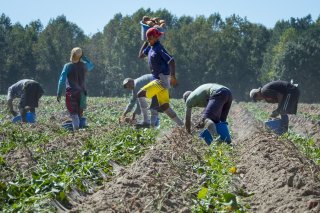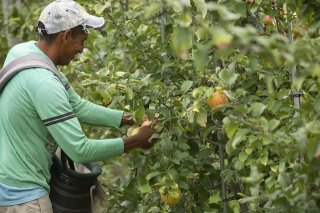Recognizing and Celebrating Farmworkers During National Farmworker Awareness Week
When perusing the aisles of any grocery store, many of us don’t spend much time thinking about the origins of the fruits or vegetables in our shopping cart. When we reach for a banana for our breakfast, do we know how many hours of labor went into picking the whole batch? Do we consider the health risks faced by the laborers who pick it? How about how hot of a day it was when the perfectly ripe strawberries in front of us were harvested? When shopping for food, it's easy to forget the long hours, staggering heat, and other challenges farmworkers must endure to put food on our tables.
Honoring Farmworkers

Farmworkers have an essential role in our social, economic, and environmental systems. The health and safety of farmworkers are essential to our livelihoods, and we are honored to celebrate the contributions of hardworking farm laborers during National Farmworker Awareness Week. This week serves as an opportunity to increase awareness of occupational pesticide safety and the difficulties that farmworkers face, while uplifting the contributions they make in feeding a thriving, growing nation.
Protecting Farmworkers
Interacting with pesticides properly is the first step to ensuring the safety of all parties involved. As an intern for EPA’s Office of Pesticide Programs, I’ve learned about the significance of the Agricultural Worker Protection Standard (WPS) and the intersection between environmental justice and pesticide safety. These standards were established to limit the risk of pesticide poisonings and exposures, providing farmworkers with critical workplace protections like those afforded to workers in other industries. For example, the WPS requires all agricultural employers to ensure workers and handlers receive annual pesticide safety training designed to decrease pesticide exposure incidents among farmworkers and their family members. Fewer exposure incidents means a healthier workforce and fewer lost wages, medical bills and absences from work and school.
Empowering Farmworkers

Pesticide safety training is just one of many activities that help protect these vulnerable communities. EPA also funds projects nationwide to enhance and complement the WPS, educating farmworkers on their workplace protections under the law. In 2020, an EPA-funded program at Michigan State University created training specifically tailored for workers in Guam and the Pacific Islands, providing workers with resources contextualized to their environment and in their preferred language. The Limiting Exposure Among Families (LEAF) project by the Association of Farmworker Opportunity Programs (AFOP), which is supported by an EPA cooperative agreement, provides lessons on reducing the possibility of exposing children to pesticide residues for about 9,000 farmworkers each year in a bilingual, low-literacy format – meeting farmworkers where they are to present information of interest to them.
Similarly, the Michigan Migrant Legal Aid program developed an informative card for farmworkers on their right under the WPS to request a designated representative. Designated representatives can obtain pesticide application information on behalf of the worker if there is a language barrier, or if the worker or handler cannot access the information themselves. This internship has taught me a lot about the many opportunities for outreach to farmworkers in plain language and multilingual formats with cultural context. Many other activities and products like these exist across the nation to support and educate farmworkers, their families, and their communities about pesticide safety and their right to protections.
I have learned that farmworker justice is environmental justice, making sure that all vulnerable and historically underserved groups get their needs addressed includes supporting this essential community.

About the Author
Bitta Momeni
Intern
Office of Chemical Safety and Pollution Prevention (OCSPP)
Bitta Momeni is an intern in the EPA’s Office of Pesticide Programs through the Virtual Student Federal Service. Bitta is in a student abroad program in Denmark while pursuing a degree in Environmental Analysis at the Washington University in St. Louis. Her ultimate goal is to promote sustainability, reduce environmental harm and address environmental justice through policy.
Editor’s Note: The views expressed here are intended to explain EPA policy. They do not change anyone’s rights or obligations. You may share this article. However, please do not change the title or the content, or remove EPA’s identity as the author. If you do make substantive changes, please do not attribute the edited title or content to EPA or the author.
EPA’s official web site is www.epa.gov. Some links on this page may redirect users from the EPA website to specific content on a non-EPA, third-party site. In doing so, EPA is directing you only to the specific content referenced at the time of publication, not to any other content that may appear on the same webpage or elsewhere on the third-party site, or be added at a later date.
EPA is providing this link for informational purposes only. EPA cannot attest to the accuracy of non-EPA information provided by any third-party sites or any other linked site. EPA does not endorse any non-government websites, companies, internet applications or any policies or information expressed therein.
